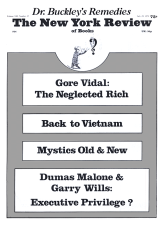In response to:
Folie à deux from the April 18, 1974 issue
To the Editors:
In Charles Rycroft’s angry review of the Freud-Jung Letters [NYR, April 18], he several times invokes Ernest Jones’s biography of Freud, implying that Jones’s book, because so reliable, makes the new collection unnecessary and indeed unfortunate; and praising Jones’s “reliability” and “integrity” as vindicated by all that has been discovered since he published.
This really won’t do. In my own investigation of Otto Gross (for The Von Richthofen Sisters) I found Jones to be definitely unreliable; and this is quite an important case—one Rycroft himself brings up. For instance, Gross did not die by murder and suicide, as Jones says, and as Rycroft persists in believing. He died of starvation and exposure. The true account of his death is given by Franz Jung, Gross’s disciple, in his autobiography; and is confirmed by a letter (in my possession) from Frieda Gross to Else Jaffe in 1920.
This is a point of more importance than may at first appear, because Jones had been quite a good friend of Gross’s before the war; had talked of him again with Frieda Lawrence much later; and had moreover admired him extremely, as he says in his autobiography. Gross’s story (a remarkable and tragic one) meant something to Jones. If he romanticized that so recklessly, he must have been a very romantic historian. And indeed romantic (in bad as well as good senses) is just the word his autobiographical portrait suggests.
One might guess that Jones was originally drawn to Gross (himself a dangerously romantic figure) almost as much as to Freud, and that he accepted the scientific disciplines Freud offered to protect himself from a fate like Gross’s—that those disciplines sat as externally and superficially upon him as a suit of armor. (He was not the only one of that generation of psychoanalysts of whom that was true.)
However that may be, Jones does not give a reliable account of the Gross episode in Freud’s career, an episode with many important dimensions, and I have reason to guess that the same is true of other similiar events and people. Much remains to be done in investigating Freud’s life. One certainly cannot invoke Jones’s authority for turning away from the new material which the Princeton Press has issued in such a handsome format and with such useful notes.
Martin Green
Medford, Massachusetts
Charles Rycroft replies:
I have just re-read my review of the Freud-Jung Letters and can find in it no statement suggesting that the footnotes referring to Otto Gross are inaccurate and that Jones’s account of his end is the true one. I merely record that the two accounts do not tally and regret that the Freud-Jung Letters achieve impartiality by half-telling a number of very tragic stories.
Nor can I find any statement in my review that I consider Jones “reliable” or that I believe that his life of Freud is always accurate; I merely record my impression that there is no glaring discrepancy between Jones’s account of the Freud/ Jung relationship and the impression that emerges from the letters.
I am amazed that Mr. Green, as an expert on literature, is not sensitive enough to style and form to appreciate (a) that my being complimentary about Jones in paragraph eight was to enable me courteously to convict Jones of suppressio veri in paragraph nine and, (b) that my criticisms of the book concerned its readability and value to the general reader not to scholars. I say this clearly in paragraph one.
This Issue
July 18, 1974



